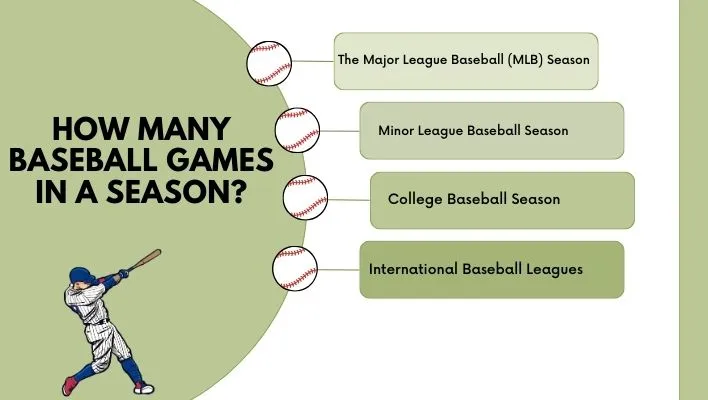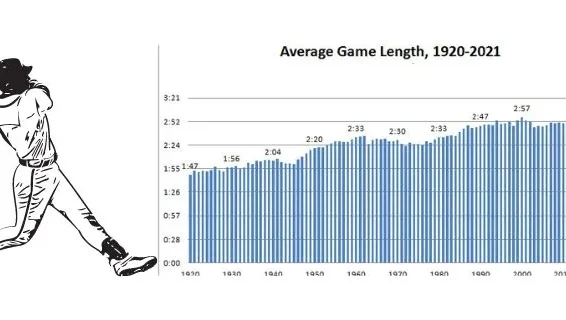How Many Games in Baseball: Major & Minor League Seasons
Baseball, often called America’s favorite pastime, has a rich history and a unique structure for its season. From Major League Baseball (MLB) to minor leagues and college baseball, each level of play has its own set of games and schedules. In this comprehensive guide, we will explore the number of games played in baseball at various levels, including the MLB, minor leagues, and college baseball. We will also delve into the concept of baseball series and the factors that can affect the length of a season.
How many games do baseball players play?
Baseball players are known for enduring a grueling schedule, with games played almost every day during the season. The number of games a player participates in depends on various factors, including injuries, rest days, and performance. In the MLB, players typically play around 150 to 160 games in a season, with some star players occasionally sitting out a few games for rest purposes. It is a demanding sport that requires stamina and endurance to perform consistently throughout the season.
See Also: How to play baseball drinking game
How Many Baseball Games in a Season?

The quantity of games played in a baseball season differs based on the league and level of competition. Now, let’s examine the various types of baseball seasons in more detail.
The Major League Baseball (MLB) Season
The MLB season is the most prestigious and renowned professional baseball league globally. It comprises 30 teams, split into the American League (AL) and the National League (NL), with 15 teams in each. The MLB season consists of 162 games, making it the longest season among American professional sports.
The season typically starts in late March or early April and wraps up in late September or early October. This extended season allows teams to compete against each other multiple times and determine the top contenders for the playoffs.
Minor League Baseball Season
Minor League Baseball serves as a developmental league for aspiring players looking to make it to the MLB. The number of games played in a minor league season differs based on the level of competition. At the Triple-A level, which is the highest tier of the minor leagues, teams typically play a 140-game season. Double-A and Single-A levels usually play shorter seasons, ranging from 120 to 140 games. These seasons offer players valuable experience and chances to demonstrate their abilities, potentially leading to promotion to the MLB.
College Baseball Season
College baseball follows a different structure compared to professional baseball. The NCAA (National Collegiate Athletic Association) oversees college baseball, setting the rules and guidelines for the season. College baseball includes a regular season, conference tournaments, and the NCAA tournament. The regular season usually consists of around 50 to 60 games, with teams playing conference games and non-conference matchups. The NCAA tournament, also referred to as the College World Series, decides the national champion through a sequence of regional and super regional games.
International Baseball Leagues
People worldwide play and love baseball, with various international leagues showcasing the sport’s popularity. Leagues such as Nippon Professional Baseball (Japan), Korean Baseball Organization (South Korea), and Chinese Professional Baseball League (Taiwan) have their own unique season structures. These leagues typically play shorter seasons compared to the MLB, ranging from 120 to 144 games. The schedules and formats may vary, but the passion for the sport remains consistent across international baseball leagues.
How do baseball series work?

Baseball series are a fundamental part of the sport’s structure, allowing teams to compete against each other in multiple games over a short period. In Major League Baseball (MLB), teams often compete in series comprising three or four games against the same opponent. These series can take place over consecutive days or with scheduled off-days in between.
Series provide teams with the opportunity to make strategic adjustments, analyze opponents’ strengths and weaknesses, and determine the outcome based on the overall performance throughout the series. It adds excitement and intensity to the regular season, as each team aims to win the majority of games in a series.
See Also: How to Score a Baseball Game
How can teams play fewer than 162 games?
Although the standard MLB season consists of 162 games, there are factors that can lead to teams playing fewer games.
One of the main reasons for cancellations is related to the weather. Games can be postponed or rescheduled due to poor weather conditions such as rain or snow.This can result in teams playing a reduced number of games, especially in regions prone to adverse weather conditions. Additionally, labor disputes or strikes can also impact the number of games played in a season. In the past, strikes or lockouts have led to shortened MLB seasons, resulting in a reduced number of games. These situations are rare but can significantly affect the overall length of a season.
See Also: How Long Are Baseball Games
Reason Why the Season has been Extended
The MLB has extended the season over the years to accommodate various factors. The expanded season is primarily due to the higher number of teams in the league. As the league expanded, more games were added to the schedule to ensure that teams had ample opportunities to compete against each other and determine the best contenders for the playoffs.

Another factor contributing to the extended season is the revenue generated from ticket sales, broadcasting rights, and merchandise. A longer season allows for more games and increased fan engagement, resulting in higher revenue for the league and teams. Additionally, the extended season provides more opportunities for players to showcase their skills and accumulate statistics, contributing to their overall career performance.
See Also: How Many Baseball Players on The Field
Other reasons why a season may be shortened
While the standard MLB season consists of 162 games, there are exceptional circumstances that can lead to a shortened season. As mentioned earlier, labor disputes or strikes can result in a reduced number of games. These situations occur when players and owners cannot reach an agreement on various issues, such as salaries, revenue sharing, or contract terms. When labor disputes arise, it can disrupt the regular season schedule and lead to a shortened season.
Weather-related factors can also contribute to a shortened season.Inclement weather conditions, like hurricanes or severe storms, may lead to games being postponed or canceled to ensure the safety of players and fans. In such cases, the league may need to adjust the schedule or reschedule games, which could result in a reduced number of overall games.
Overall, while the standard MLB season consists of 162 games, various factors can affect the number of games played. From weather-related cancellations to labor disputes, the length of a baseball season can vary under unique circumstances.
FAQs
The NFL regular season consists of 17 games per team, totaling 272 games across the league.
The NHL regular season typically consists of 82 games per team, resulting in a total of 1,312 games across the league.
The MLB season typically runs from late March or early April to late September or early October, spanning approximately six to seven months.
The number of games in the MLB season is the result of an expansion of teams over the years, providing an adequate number of games for teams to compete and determine playoff contenders.
Seasons can have more or fewer games due to exceptional circumstances such as labor disputes, weather-related cancellations, or other factors that may require schedule adjustments.
conclusion
In conclusion, baseball seasons vary in length and structure across different leagues and levels of play. From the MLB’s 162-game season to the varying schedules in minor leagues and college baseball, each level offers its own unique experience for players and fans. Baseball series add excitement and intensity to the regular season, while exceptional circumstances can lead to shortened seasons. Understanding the number of games in baseball is essential for fans and players alike as they navigate the intricacies of the sport.
